"I stare these inequities in the face every day"

This South Asian Heritage Month, we spoke to Dr Sarah Finer, co-lead of the Genes & Health study, to learn about how the project aims to improve health outcomes for Bangladeshi and Pakistani people.
“It’s no secret that the majority of the healthcare provided in the UK – and around the world – is based on research and evidence from White European people. This is because historically, people from Black, Asian and minority ethnic communities have been reluctant to take part in research for various reasons, including lack of proper, real engagement by researchers.
“This means that while most treatments and tests work for lots of different communities, we can’t always be confident that they’ll work as well for every community. We also know that some conditions like heart disease and diabetes are more common in South Asian communities, but we don’t fully understand why, which is stopping us from giving even better treatment. Combined, this leads to inequities in patient care and outcomes which I’m all too familiar with as a doctor. I stare these inequities in the face every day.
“To rectify this, we need to involve people from all communities in research and carry out targeted research into specific communities. That’s what Genes & Health aims to do – it aims to better understand the genetics of people from Bangladeshi and Pakistani origins so that we can provide them with better healthcare.
We’re out there, working with the Bangladeshi and Pakistani communities
“The study is pretty straight forward. Volunteers give us a sample of their DNA which we study in detail to understand the genetics of these communities. Doing this will help us better understand why different conditions impact them more than others and will help us to find new ways to prevent, diagnose and treat various conditions.
“And we’re already seeing results. Thanks to the over 56,000 people who’ve taken part so far, we know more about the health of these communities than ever before, including how we predict the risk of type 2 diabetes in these communities. We’ll also use the information collected to develop and improve how care and services are provided to these communities. And researchers around the world can access the database of information with permission, to further their own studies into healthcare.
“I know that people may have concerns about taking part, especially as we’re asking for a DNA sample and access to health records. But I can reassure everyone that we take data security very seriously and hold anonymised data in a highly secure trusted research environment with ISO27001. Researchers can only access it with permission, and there are many rules and regulations on how and when they can access and use it.
“One of these is that access has to be agreed by our patient representative panel who are all Bangladeshi or Pakistani. If this group don’t think a project will benefit their communities and so don’t want to grant access to the Genes & Health database, we don’t do it. If they can see the benefit to their communities, then access is granted.
“This is one of the aspects of Genes & Health I’m most proud of – our patient and public involvement and engagement work. We’re out there, working with the Bangladeshi and Pakistani communities of East London and listening to what they want and need. I hope we can do even more of this and get even more people volunteering to join the study and get involved in other ways. By doing so, we can truly develop and deliver equitable care for all.”
Dr Sarah Finer co-leads the Genes & Health study with Professor David van Heel.
Read more:
